
..........................................................................................................................................................................................................
rapha pro-team road shoes

the idea behind waterproof socks is, from a logical point of view, quite sound. with many road shoes and one or two destined for the offroad world, featuring ventilation on the upper, it's not hard to see where rain or road water might gain easy access to those little tootsies. thermal, windproof and waterproof socks would appear to be the very things to mitigate against undesired ingress, and assuming your shoes to be up to accommodating a modestly increased bulk, autumn and winter riders no longer need fear frostbite or rust.

but those of you who possess even a single pair of waterproof socks will undoubtedly have already found the fly in that very ointment. assuming we're still discussing the art of pedalling in cold, wet and windy winter months, there's an evens chance the nether regions will be clad in thermal bibtights, the legs of which will be carefully arranged over the top of the aforementioned waterproof socks. thus, when the legs of those tights become eventually and often quickly saturated with precipitation, capillary action will almost certainly draw excess water inside a pair of socks designed to repel boarders from the outside.
ironically, it's a simple test to prove the efficacy of warranted waterproofing, by noting that the rainwater remains steadfastly inside the sock even when removed prior to a much-needed, hot shower. it happens to me all the time and it happened most recently midweek past.
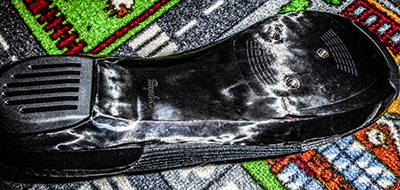
rapha were kind enough to send a pair of their newly announced pro-team road shoes, some two weeks ago, just in time for pretty much all hebridean riding to be curtailed first by storm ciara and very soon afterwards by her brother dennis. i would be fibbing if i intimated that i had remained indoors for the duration of both, but given that the ritchey currently sports a pair of campagnolo bora wto 33mm section carbon rims, i thought discretion to be the better part of valour and ventured out on the 'cross bike, with its better stability in the face of storm-force crosswinds and affording the opportunity to nip onto the grass at uiskentuie strand.
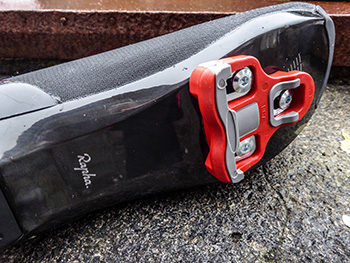
the specialized 'cross bike currently sports a pair of ritchey off-road pedals, necessitating footwear capable of accepting a two-bolt cleat. to be honest, the majority of the sunday morning peloton make use of this type of shoe, even on their road bikes, for pragmatic reasons rather than any mistaken aesthetic appreciation. with the majority of our parcours comprised of single-track roads with passing places, it often seems a tad safer to dab a foot on the grass verge with a chunky sole and minimal cleatage, than take our chances with an ultra smooth carbon sole and a triangular, three-bolt cleat that will undoubtedly fill with mud.
until recently, that state of affairs has entailed that the ritchey be fitted with tom's micro-road pedal, an item that bucks the road-going trend and features an all-metal, two bolt micro cleat. road shoes need not apply. however, in order that i re-acquaint myself with the duck-walk into debbie's, ritchey kindly sent a pair of their wcs carbon road pedals specifically to match rapha's highly desirable pro-team shoes.
a review of the pedals will ensue shortly.

meanwhile, having apparently discovered a hole in the incessant stormy weather currently strafing the hebrides, i elected to spend a very wet wednesday, acclimatising myself with the joys and possible iniquities of larger cleats and bigger pedals. i should probably point out that during all of my rides in the pro-team shoes, they have been obscured from view by highly necessary, waterproof overshoes, though these have in no way mitigated the resulting review.
long before the pro-team shoes made it anywhere near the hebrides, they had been subjected to the rigours of pro-team demands, specifically riders such as ef education first's lachlan morton and neilson powless. logic would dictate that you never ask a pro rider for advice on clothing, footwear, bicycles or componentry, specifically on the basis that they're paid to ride whatever is provided by the sponsor. thus, to read mr morton's claims that "I generally hate new shoes for a month, but loved these straight out of the box.", or neilson powless "After the first ride I already knew I wanted them for the race (tour down under)" are hardly definitive recommendations on which to hand over your £260 there and then.
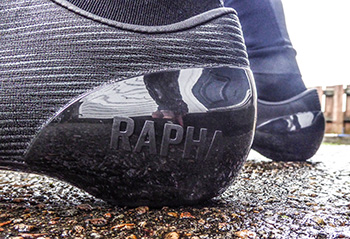
however, it transpires that, in this case, their perceptions are right on the money. it is my habit to change into my secret identity in the bathroom, before making my way downstairs in my slippers, prior to adding the peripherals, such as helmet, gloves, jacket and footwear. i jest not when i state that the transition between well-worn slippers and these brand new pro-team road shoes was pretty much seamless. the extra bulk of the waterproof socks disturbed the proffered comfort not one whit.
rapha claim that the jacquard woven powerweave upper features 'glove-like comfort', a claim with which i'd be more than happy to agree. additional claims that the powerweave' flexibility allows it to 'hug the foot' seem perfectly justified. during a very wet and windy wednesday bike ride that had necessitated wearing of their pro-team, goretex hooded jacket, i'd pretty much forgotten that in which my feet were encased within a matter of kilometres, probably the finest compliment that can be paid to any pair of cycling shoes. the stiff carbon sole seemed only to aid and abet that comfort.

with these new shoes, rapha have eschewed the old-skool trend to equip cycling footwear with laces, opting instead for the admittedly more pragmatic boa closure system, handy if readying for the final sprint (though, in truth, i doubt i'll ever find out). tension is applied easily by turning the two dials anti-clockwise; for a quick exit, 'tis but a matter of pulling upwards on each dial to loosen the cable. the shoes arrived with their own musette, in which there are a couple of small insoles allowing even finer tailoring of their out-of-the-box comfort. mine are still within the musette, as i found the insole comfort to be just ginger peachy, thank you very much.
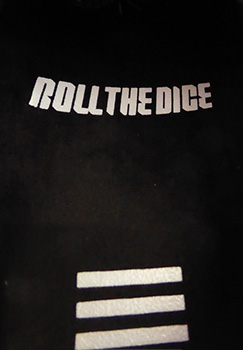
though a goodly proportion of rapha's pro-team range of clothing is designed to fit those of a slim consitution (mamils need not apply), this latest release of similarly badged footwear features no such retstriction. power transfer (meagre though that may be) is greatly enhanced by the closeness of fit and that immoveable carbon sole, but most certainly not at the expense of comfort. additionally, their comparatively light weight of around 220g per shoe (size 42) only enhances the experience of being an ef education first professional, without the contractual need to ride quite so fast.
they did not succeed in keeping my feet either warm or dry during my exceedingly inclement mid-week bike ride, and i never expected that they would. however, they did offer unsurpassed comfort. subsequent rides have done nothing to undermine that particular claim.
rapha's pro-team road shoes are available in black, white, or a purple/blue rainbow effect. available sizes range from 36 - 47, with half-sizes available from 40 and above. size reviewed was 44. price is £260. rcc members can purchase from tomorrow, while general release is on wednesday 27 february.
monday 24th february 2020
 ..........................................................................................................................................................................................................
..........................................................................................................................................................................................................free speed

in his much-admired training book, graeme obree advised that the intrepid bike rider ought best to adhere to a specific training route, for the simple reason that it would help quantify any improvement in speed and fitness or, more disarmingly, any subsequent deficiency, depending on the modus operandi du jour. however, he was quick to point out that even this method could and probably should, be substituted for hours on the indoor trainer.
the reasoning, as you would expect from mr obree, was sound and logical. if i might localise the procedure somewhat and propose a training ride that extended from the croft in bowmore, along the low road to port ellen and back (close on 30km), it would take only marginal discrepancies in wind speed and direction, to throw my training plans under the bus. a 30mph tailwind on monday, could easily be supplanted by a 35mph headwind on tuesday; if such variances continued throughout the week, where would be the standard by which i might measure my training routine for any real benefits?
shift the entire process into the sitting room (mrs washingmachinepost's disapproval not withstanding) and the complete lack of headwinds or tailwinds would surely lead to more reliable evidence, no doubt accompanied by sheer boredom and soul-destroying tedium. i fear only the truly dedicated need apply.
however, what neither of the above will tell the hapless rider at any stage of the regime, is whether their position on the bike is robbing them of 'free speed'. and we need not end the process there. suppose, by some quirk of fate, that your position on the bicycle is at its optimum, and there are no more gains to be acquired by even more physical contortions. is that favourite jersey of yours actually slowing you down? would you benefit from narrower handlebars? and are the furry bunny ears humorously applied to your helmet, more of a comical hindrance than a help?
the big and ultimately expensive problem is that, you just don't know, without booking space in the community wind-tunnel (we like to call it uiskentuie strand). this sort of expense would usually be borne by only the best financed professional cycle teams. even a compact and bijou wind tunnel can cost £4,500 per day for the basic services. you'd really, really need to want to win the wednesday night club ten, to spend that kind of money.
however, a recent development by brighton-based 'body rocket' might be a considerably more economic solution to your plans for world domination. subject to a final round of funding expected in march of this year, they are soon to launch what they claim is the world's first direct force drag meter. they'd be the very folks to ask about the cost of hiring a wind tunnel, for their comparison tests were made at that of southampton university, to ensure the reliability and calibration of this new device. the average difference between body rocket and the univeristy's wind tunnel was a mere 0.9%; probably as close as it's likely to get.
to provide the rider with 'real-time' measurements the device takes its measurements from three distinct points on the bicycle: smart pedals, seat post and aero-riser (all curently on offer from body rocket). that way, you can head into a galeforce headwind, while incrementally altering your position on the bike, and immediately view which measures work and which definitely don't. as to the latter, my money's on the furry ears.
body rocket founder , eric degolier pointed out that "...despite the rider being 85% of the full aerodynamic package, no-one has been able to provide cyclists with accurate feedback on drag... and in real-time."
of course, the word 'expensive' is a relative and effectively undefinable term, so while the device will undoubtedly be considerably cheaper than a day in a wind-tunnel, it's unlikely to be the sort of item given away free with a subscription to 'cycling weekly'. the crowdfunding campaign is due to commence next month, but if you really can't wait that long, you can get in touch with body rocket via their website listed below.
sunday 23 february 2020
 ..........................................................................................................................................................................................................
..........................................................................................................................................................................................................half a million

"I need a bicycle so that I can arrive to school early to start my lessons. I need to arrive at home early so that I can help my parents."
in 2016, for the first time, 70 million cars were produced in a single year. that's a significant number of additional vehicles on the world's roads, and either one for celebration if cars are your thing, or you have a vested interest in their production. if you're one of the planet's pedestrians or cyclists, your opinion might beg to differ. in the years since number one son learned to drive, some ten years ago, even a small village of 1,000 people, such as bowmore, has, reluctantly or otherwise, succumbed to the stranglehold imposed by the ever increasing number of cars that are driven or, arguably more irritatingly, parked in every nook and cranny available.
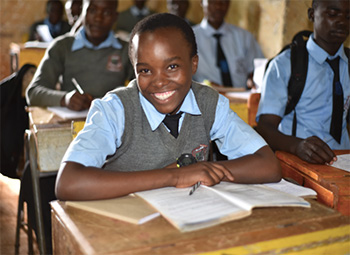
and many are parked in places where nooks and crannies have never, nor will ever, exist.
if you'll pardon the pun, i've been down this road before, and sadly have to acknowledge that i'm very definitely not on the winning side. to paraphrase monty python's flying circus,"it's an unfair cop, but society is to blame." it would, of course, be naive to insist that transportational equalities and inequalities be evened out across the land; there are locust-plagued countries in africa where the phrase 'transport infrastructure' means a whole lot less than it does in the western world, where travelling to and from work or school can mean the sort of effort that even dyed-in-the-wool gamers would think twice about applying to their x-boxes and playstations.
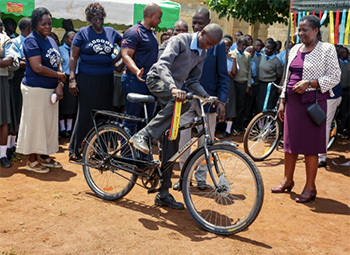
and where my former neighbour would drive his car a few hundred metres to collect a daily paper, a sizeable number of africans need to walk several times that distance just to collect fresh water each day, before commencing the rest of the working day, or walking more miles to get to school. britain's roads may suffer badly from potholes and gas mains repairs, but at least there is some semblance of insfrastructure designed to move people from point a to point b, even if that means sitting for an hour or so in a motorway traffic jam.

fifteen year-old damela achieng owuor, lives five kilometres from bar union secondary school in kisimu, kenya, providing her with a ten kilometre (six mile) walk each day to receive her education. bowmore village is 1.6 kilometres (one mile) from end to end, but a significant number of parents drive their kids to school (both secondary and primary), mostly over distances less than half the length of the village. the notion of walking or cycling would, quite literally, never occur.
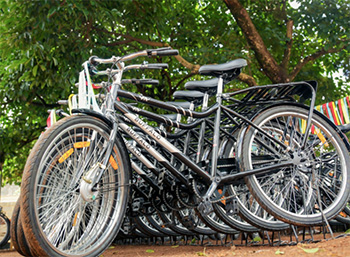
damela, however, has been presented with a buffalo bicycle from world bicycle relief, one of many delivered to students at bar union since 2016. this has resulted in a notable improvement in attendance and fewer kids arriving late. damela's bicycle was one of a total of 102 recently presented to pupils at the school, bringing the total number of bicycles donated by wbr, since operations began, to 500,000. one buffalo bicycle costs £120, which compares rather favourably with the £27,000 average price of purchasing a car in the uk. in fact for that price, world bicycle releief would get a head start of 2,250 bikes towards their next half-million, meaning that number of african schoolchildren, nurses, dairy herders and others could travel more freely and easily, becoming more productive than the usual one person occupying the average british car.
worth thinking about the next time you're watching top gear.
world bicycle relief - donate | world bicycle relief is the nominated charity of the ride of the falling rain.
saturday 22 february 2020
 ..........................................................................................................................................................................................................
..........................................................................................................................................................................................................saved

since day one, rapha cycle clothing has announced itself on address labels and the like, as rapha racing. a quick check of their website, at the time of writing, and there in the very bottom left hand corner is that very nomenclature, underlining, if you were ever in doubt, that cycle racing is an integral part of the imperial works' dna. that was, if memory serves correctly, the state of affairs, even on release of their first classic jersey in the summer of 2004. this may explain why, in those early weeks of commercial existence, ceo simon mottram received a phone call from a gent, stating that he had been an admirer of the product for many a long year, and he was now glad to see it available in the uk.
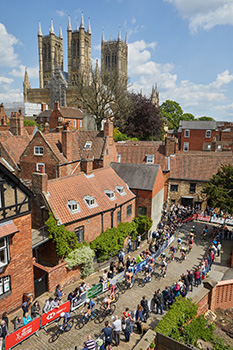
it would be another three years before they joined forces with the velocipedinal royalty of london's grays inn road, to form the rapha condor cycle team, the erstwhile 'men in black' and thus legitimising their claim to indeed, be recognised as rapha racing. mr mottram's guiding vision, for as long as i've known him, has always been to promote the cause of road-racing, with the expressed intent to popularise it in the eyes of the sporting, and possibly, non-sporting public. it would be a hard-hearted critic who would deny them their professed spot in the sun; cycling may not have achieved the heights of snooker, soccer, golf et al, but it's come a long way in the past sixteen years. rapha's subsequent sponsorship of team sky, canyon-sram and latterly ef education first, can certainly have done no harm.
that the present economic model associated with professional cycling is far from perfect has been a matter of discussion almost from the day greg lemond was in short trousers, and though many have propounded their solutions for change, little has, in fact, changed. however, around one year past, rapha published the rapha roadmap, in effect a lengthy manifesto for change, offering specific points that might, just might, dispense unceremoniously with the grudgingly accepted status quo. it seemed to many, a rather pretentious, yet toothless attempt to mirror the claims of many a political party when not in power, merely sniping from the sidelines with little chance of ever being called to account.
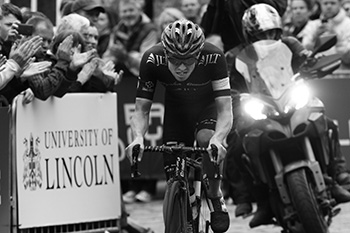
i hold my hand up as being one of its critics (as if i've ever attempted anything so radical, yet worthy).
hark back to those heady days of 2007, the inaugural year of the aforementioned, rapha condor cycle team, constituted as one that would compete, almost exclusively, across the domestic race scene. the first major victory for the squad was provided by dean downing at the lincoln grand prix, an event renowned as the longest running in uk history, having first surfaced in 1956. however, continually mounting operating costs, including that of policing the event and the late withdrawal of a key sponsor, led the organisers to announce recently, that the 2019 event had likely been the last. it seemed that, despite increased uk world tour successes abroad, the heyday of british cycle racing might well be in danger of evaporating in front of our very eyes.
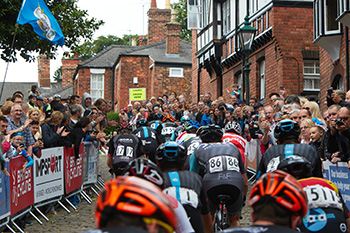
it would be easy to then point the finger at imperial works and ask them why they didn't simply put their money where their online mouth had been? except that such a thought had already occurred, rapha having signed a two year, title sponsorship deal with event organiser, dan ellmore.
"Having a brand such as Rapha recognise the importance of the event and get behind us to keep it running, is a fantastic position to be in and we're really looking forward to working with them."
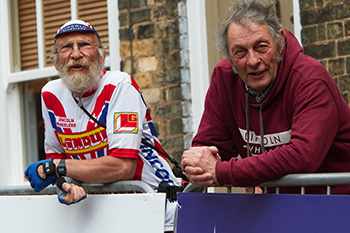
if i were rapha, the temptation to be unbearably smug and self-righteous would probably be overwhelming; i'd already be planning a ticker-tape parade through the streets of lincoln. that's quite likely why nobody would ever allow me to be in charge of anything to do with cycling. rapha explained their largesse more modestly. "...We have ... an opportunity to change the game, act upon the advice in the Roadmap and, ultimately, put our money where our mouth is. [...] Using this race as a case study, we will investigate, in practical terms, just how you secure a sustainable financial future for a bike race. The Lincoln GP is our local race, but the lessons we will learn by supporting it, are ones we hope will be applicable to any race, anywhere in the world."
whatever your opinion of rapha, whether you regard it as a grandiose marketing strategy, the bastion of wannabes or pro-race look-alikes with too much in the way of disposable income, or the very apparel for which your wardrobe always has just one more space, their sponsorship of the lincoln gp has effectively saved it from being just another one of those cycle races of which everybody holds fond memories. of course, that might simply bolster any existing opinions you may already hold, but actions usually speak more loudly than words, and actions such as this surely deserve a concerted round of applause.
"We simply couldn't imagine a British race calendar without the Lincoln."
photos: phil crow
friday 21 february 2020
 ..........................................................................................................................................................................................................
..........................................................................................................................................................................................................an interview with kenny pryde
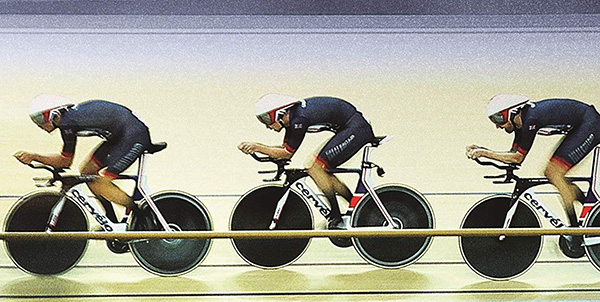
it's something of a tired cliché that america and britain are two countries separated by a common language. and despite an appreciable overlap of riders, it wouldn't be too unkind to describe road-racing and track-racing as two velocipedinal genres, separated by a common purpose. this becomes more definable if considering the training methods and machinery employed across both disciplines.
track racing, if anything, is more responsive to the numbers game: rider power output and aerodynamics, to be a tad more specific. though i doubt that the latter varies greatly whether the races rotate clockwise or anti-clockwise, if you've ever attended an indoor track meet, you'll be well aware of the desire to maintain a constant (occasionally unbearably) warm temperature. though i confess to be considerably less than au fait with computer fluid dynamics, i'd presume that removing any variables of temperature when calculating tube and wheel profiles, makes life a bit easier than would be the case for a road bike that has need of performing in often unexpected weather conditions.
and, when it comes to track events undertaken over a specified number of laps, gauging the sustained power output required, would be similarly quantifiable. the latter became the forté of former british national track coach, peter keen, very much the originating subject of kenny pryde's the medal factory, released today and reviewed on the post yesterday. in retrospect, and with regard to recent events concerning the final aspects of team sky, it's a book that very much needed to be written. so, i asked kenny what prompted the writing of 'the medal factory'.
"I was working at the now closed Cycle Sport magazine on a feature on Chris Boardman and Peter Keen, reckoning the impact they had on British Cycling was a tale worth telling. The story got bigger, I realised I needed to speak to more and more people and then - karma - Cycle Sport was closed down. So I thought I'd expand the feature into a book with a longer historical perspective and talk to more people."
as one who regularly reads the guardian newspaper's weekend review supplement, it seems not uncommon to discover that even authors of fiction are often surprised at the twists and turns their characters seem to engender, without recourse to the wishes of the author. i too, have frequently set out to write one article and ended up with something entirely different: books and features frequently seem to have minds all of their own. it therefore seemed not too unseemly to ask kenny if the book, as published, was the book he set out to write?
"Not really, no. The original manuscript went back to the 1984 Los Angeles Games and included stuff about the growth of sport, global broadcasting, commercial sponsorship. There was even a bit about Jane Fonda's workout video. Plus, so many stories were cut; Jim Hendry, the 1992 Games, Yvonne McGregor, Graeme Obree, Colin Sturgess. And of course the effluent hit the ventilation system several times while I was writing. Shane Sutton resigned, Jess Varnish spoke out, sexism and bullying in public life became a massive public issue. Then there was the Fancy Bears hack, Lizzie Deignan's problems, the Jiffybag mystery, the DCMS Parliamentary inquiry, Chris Froome's Salbutamol case, Dr Freeman's GMC hearing. There were mornings I was scared to check the news, because I was scared everything I'd written would turn out to be irrelevant."
gary larson, progenitor of the idiosyncratic 'far side' cartoons, stopped his creative process at the beginning of 1995, effectively retiring as a cartoonist. his output, since commencing in 1979, was prodigious to say the least, a scary prospect to a once budding cartoonist such as yours truly. way back when, despite apparently having a bit of a knack for scribbling cartoons, the overwhelming likelihood that i would find myself bereft of ideas within a matter of days, prevented from me ever approaching the foothills.
for the selfsame reason, despite constantly reading that anyone who writes regularly, has a book in there somewhere, i'd prefer to demur from even starting. it's all very well having a loose idea for a potentially award-winning narrative in your head, but in the process of researching the subject to ensure an avoidance of embarrassment and accusations of ineptitude, i'm pretty sure i'm less than equal to the task. in writing the medal factory, kenny pryde has demonstrated an impeccable approach to the research aspect, but was access to the information as straightforward as he's made it appear?
"Ah. No. For the reasons mentioned, lots of people were keeping their heads down, and I don't blame them. I wanted to ask them about the characters who were all over the news for all the wrong reasons. But I was lucky. Lots of people were generous with their time and I've been following the sport for a quite a while now, so I think that helped."
the joy of what might reasonably be termed, the non-linear approach to writing, afforded by contemporary word-processing software, undoubtedly eases the prospect of being appraised of different stuff at different times. all this can then subsequently be placed in an orderly and chronological fashion. that's not to say, however, that so doing is a simple affair. Was it a complex matter to arrange the book in such an eminently readable and cogent format?
"Initially I thought I'd try some kind of 'clever' structure that went back and forward in time. But I binned that idea quickly and stuck to a simple one event after the other thread. I had a hard enough time of keeping track as it was!"
but there's no denying that part of the fun of investigative journalism, or authorship, is discovering hitherto unknown factors that might conceivably alter an opinion about something or someone. assuming this is conveyed to the reader in commensurate fashion, a similar sense of discovery can become a favourable feature within the narrative. in the writing of 'the medal factory', was there anything kenny came across that he wasn't expecting?
"One or two things, though nothing drastic. There were some shocks and a few disappointments, but mostly illumination. When you get a combination of money, success, power and human frailty, the stories aren't complicated, they're kind of universal. There's always lots of arse covering and making stuff up as you go along in any businesses."
prior to the london olympics in 2012, i recall reading a report in the news media, that dave brailsford had had his cycling budget cut by close to £2 million. for the majority of us, that amount of money is the sort of sum we'd be delighted to win in the national lottery, so i did feel a smidgeon of sympathy for the man charged with implementing the world performance programme. however, on further reading, it was noted that this meant a reduction from £27 million to nearer £25 million.
without wishing to seem disloyal, that seems one heck of a lot of money to spend on acquiring a collection of metal badges, no matter the sense of national pride that might ensue. does kenny see parallels between the east europeans of yesteryear and their propaganda bid for victory, and the amount of money britain spends on effectively doing likewise?
"I think its very similar. The State invests money to help citizens feel good, generate some global PR and give the State broadcaster something to screen and cheer us all up. Funnily enough, I think 'sport-as-propaganda' now matters less, now the Cold War has ended. When UK sport was properly amateur and we were getting our arses kicked by the Eastern Bloc, we had other things to cheer us; our colour tellys, VHS recorders, holidays on the Costas and football teams that could win internationally. Who cared about the team pursuit qualifying times back in 1980? We had Coke and Levis."
given such vast sums of money being spent on 'going round in circles', the concentration required from the competitors and the tenacity and integrity of those involved in logistics, coaching and administration, cannot but separate the individuals involved from what you and i might term 'real life'. such a situation, quite possibly, could not be otherwise, but did pryde get the impression that the team gb operation at manchester exists in a bubble, somewhat detached from reality?
"I think elite sports everywhere exist in a bubble. They're not sports like you and I and the people reading about cycling practice them. British Cycling in Manchester was - and is - two parts: there's the BC handling membership and grass-roots part and then the World Class Performance Programme. They're in the same building, but miles apart in many ways."
'the medal factory' makes it plain that, at various stages during implementation of 'the programme', those involved were improvising, if only because they'd never been in such a position before. some tactics worked almost exactly as planned, while others never came close. but when you read that an alleged £10,000 was spent on designing and manufacturing a chainring, let alone the cost of the bespoke carbon bicycles, then a few years later everyone's riding shop floor cervelos, you do begin to wonder.
then there's the alleged bullying of riders by coaching staff and accusations of sexism by one or two of the female competitors. did kenny ever get the impression that british cycling had actually learned anything from the process as described in the book, or is it still business as usual?
"I'm sure that 'lessons have been learned as the cliché has it. Certainly processes and oversight will have been tweaked and I'm sure that everyone inside BC is watching what they say much more than they did in 2000. But then the wider culture and society we all work in has changed in the last 20 years too. What hasn't changed will be the desire to win, because the hands-on coaches working with the track squads are still the same. Shane has gone, but Paul Manning, Jan van Eijden and Iain Dyer are still there."
peter keen's original application for funding was designed to lift british cycling out of the doldrums it had inhabited for many a long year. his plan identified the track events in which there were opportunities for victory. taking into account the annual budget for cycling's world performance programme alone, never mind that spent on other olympic disciplines, the whole project begins to take on the trappings of big business. is it still 'sport'?
"When you asked earlier about there being anything that I discovered, I came to realise that professional sport is just a branch of showbiz. It's showbiz for physiological freaks, part of a massive global entertainment industry. It's a more obvious observation when you look at football - or, especially - American football and the SuperBowl! There's the sport we do - the road races and club time-trials, the mid-week track league - and then there's professional cycling. They look the same, but they're very different. When you see pro sports as showbiz, it takes on a different perspective."
the medal factory. british cycling and the cost of gold by kenny pryde, is published today, 20 february, by pursuit books.
thursday 20 february 2020
 ..........................................................................................................................................................................................................
..........................................................................................................................................................................................................the medal factory. british cycling and the cost of gold. kenny pryde. pursuit books hardback. 308pp illus. £16.99

with this year's racing season already underway, 2020 looks like it might just see the resurgence of colombian rider, nairo quintana. formerly with spain's movistar, quintana has continued on the same bike marque, but swapped jerseys for that of arkea samsic. in this past weekend's mont ventoux stage of the tour de la provence, the diminutive south american provided a masterclass in ascending to take the stage victor's spoils. a brief recap was provided on global cycling network's youtube channel, demonstrating the colombian's panache on the climb to the iconic weather station atop the giant of provence.
the latter video moment, however, was remarkably short-lived. far from allowing the viewer to appreciate this early season display of joie de vivre from a purely velocipedinal point of view, the cycling imagery was quickly replaced with a graphic explaining that quintana's team-mate had ridden for 6.44 at a power output of 414 watts, then continued to finish over 23 minutes down on the colombian at a power output of 365 watts. one can only presume that nairo's numbers were a tad more substantial. once again, just like yesterday's discussion of the numbers that describe colours, the soul was somewhat sucked out of a moment of joy.
if a scapegoat for this state of wattage affairs were required, we probably need look no further than british cycling's, peter keen, a key figure in the history of britain's eventual cycling success on the international stage, and identified as such in this superb new book - the medal factory - from author kenny pryde. keen reputedly first came to the attention of the former british cycling federation in 1986 while he was working on the software development for the revolutionary kingcycle.
"The Kingcycle was essentially a glorified turbo trainer that could be used to measure a rider's power output in watts, their heart rate, as well as enabling a VO2 maximum figure..."
keen's subsequent meeting with an 18 year-old chris boardman in 1987 seems truly to have been a meeting of minds, and where boardman was introduced to the four training zones that subsequently became the subject of much discussion in the peloton and cycling press. according to boardman "He might well have been the first person in the world to quantify training like that...". from keen's point of view, here was "a young talent (boardman) who was committed to the same principles as himself..." in conjunction with national coach, doug dailey, it was effectively this triumvirate that brought home boardman's 1992 gold pursuit medal from barcelona.
in 1997, peter keen was appointed as the replacement for an ailing doug dailey as national cycling coach, arguably the turning point in the international fortunes of british cycling. the pre-existence of manchester's state-of-the-art velodrome, on which work was completed in 1994, provided not only the impetus and facility from which to grow, but a tangible, £9.5 million edifice from which to base the national cycling body's operations.
keen then set about writing the 'cycling world class performance plan', presented by way of application for lottery funding, "...pinpointing events in which Britain could win medals at Olympic Games and World Championships.". according to the author, the twenty-five page, 7,000 word treatise is still a remarkable document, even when viewed with the benefit of twenty years of hindsight. the submitted application was favourably viewed in whitehall, subsequently decreeing that the now re-named british cycling would receive its first tranche of funding by the end of 1997.
from those little peter keen engineered acorns, it would be safe to say that britain's current standing on the international cycling podium originated. an entire trophy cupboard worth of medals surely proves testament to that? kenny pryde, it seems, disagrees: "However, all things considered, it would be both unfair and inaccurate to posit 1997 as the absolute year zero of British cycling, given that much of the preparatory work that Keen and his cohort would benefit from was already in place."
however, it was during keen's tenure, that the next wave was installed, and dave brailsford, formerly a 'consultant equipment supplier' began his rise to prominence. brailsford was first brought to peter keen's attention by road team manager, john herety, and became the 'front of house' representative, while keen continued to refine and develop his performance plan. it was also during this period that the infamous shane sutton was recruited to the fold, along with heiko salzwedel as performance manager.
move forward a number of years, and in the approach to the athens olympic games in 2004, peter keen fulfilled the ruminations concerning his future at british cycling, and moved on, initially fronting a gsk funded sports science project, before becoming head of uk sport. thus, towards the end of 2003, dave brailsford was (apparently reluctantly) installed as head of performance and the intriguing narrative of 'the medal factory' was set to continue.
brailsford had the management nous to continue with keen's world performance programme, albeit on his own terms, arguably peaking at london's olympic games in 2012, bringing knighthoods to both himself and bradley wiggins, the latter having taken the yellow jersey in the same year's tour de france as leader at team sky. pryde details every turn of brailsford's creation of the victorious team sky in 2009, controversially recruiting wiggins from jonathan vaughters' team mid-contract, in order to satisfy his claim that he'd win the tour with a clean british rider within a five-year period. this, it was openly stated at the time, "was going to ruffle feathers", not least from vaughters himself.
"Legally, I can't say much about it. It wasn't any fun, let's put it like that."
kenny pryde has written one of the finest cycling books it has ever been my privilege to read. his forensic and balanced investigations into virtually every nook and cranny of british cycling's quest for medals, while gently implying a money-no-object philosophy, is little short of exhaustive. reading the finely crafted narrative, however, is anything but exhausting; in fact, quite the contrary; the more you read, the more you want, nay, need, to read. and despite the multiple threads that required to be drawn together from many different sources, to provide the audience with access to probably the most important period of uk cycling, the end result belies what must have been a very trying labour of love for the author.
he deals intelligently with the jess varnish situation, uncovers the twists and turns related to shane sutton's lengthy period of infamy, the notorious wiggins' 'jiffy bag' incident, and the questions raised over chris froome's 'therapeutic use exemption'. pryde's narration of events bears comparison with matt rendell's 2006 publication, 'death of marco pantani', predominantly on the strength of his investigative tenacity, and unquestionably lays claim to pride of place on your bookshelf.
sports book of the year, no question.
an interview with the author will appear tomorrow.
kenny pryde's 'the medal factory' is published by pursuit books on thursday 20 february. thanks to the generosity of the publisher, i have one copy of the book to give away to the first sender of the correct answer to the following question: which rider won gold for gb in the 1992 barcelona olympics?
along with your answer, please supply a full postal address, (i have to send the book somewhere) and mail your answers to brian@twmp.net by friday 28 february.
wednesday 19 february 2020
 ..........................................................................................................................................................................................................
..........................................................................................................................................................................................................numbers

having gone to extraordinary lengths to point out my disfavour for numbers, something of a self-referencing problem, in that, the more i consider it a problem, the more of a problem it becomes, it seems i may now have been hoist by my own petard, when it comes to fulfilling the practical aspects of my vocation.
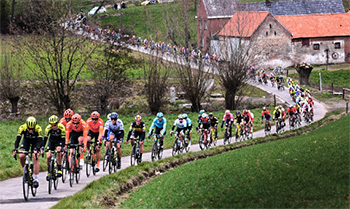
having recently been asked to design a brochure for one of the island's nine distilleries, it became necessary to employ their bona-fide, corporate colours. these were supplied in the form of specific pantone swatches, which i had subsequently to convert into process cmyk (cyan, magenta, yellow and black). specifying specific pantone colours to a printer requires that they're printed as spot colours, making everything a tad more expensive than it needs to be. you may be surprised, and utterly disinterested to learn that cmyk is represented by a series of four separate numbers, indicating the percentage of each colour adding up to the desired result.
for instance, take the red colour associated with team ineos: (25,100, 100, 26), or the yellow of jumbo visma (11, 19, 78, 0). so, despite my much vaunted allergy to numeracy, it seems that my working life is actually more dependent on numbers than i'd like to admit. however, though the irony is not totally lost upon me, i cannot but feel even sorrier for those embroiled in the online world; their colours are expressed in hexadecimal (nope, me neither). take the yellow that provides the backdrop for these very words: ffcc46, or the shade of blue employed in the logo for omloop het nieuwsblad: 0092e6.
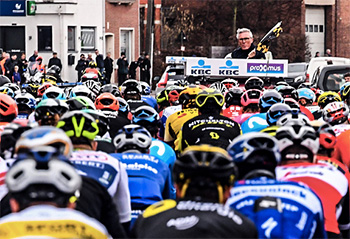
which brings me neatly round to the next designated number of current importance: 290220 (or the american version: 022920), the point of the year when bunting should be trailed out all across the village, accompanied by cheering and party poppers, for the race formerly known as het volk will introduce us to the 2020 season of spring classics. however, in the light of the recent inclement weather systems to invade the uk's airspace, prefacing 'classics' with the word 'spring' seems a bit on the optimistic side.
while for many of us, it will always be het volk, since the demise of the newspaper that first fostered its existence in 2009, the race has become arguably better known as omloop het nieuwsblad and comprises both men's and women's events, commencing in ghent and ending in ninove. the women's event encompasses fractionally over 126km, while the men's race, upgraded to world tour status in 2017, is a double-metric century at 200km.
belgians greg van avermaet and sep vanmarcke have three wins between them, emulating their predecessors, eddy merckx, roger de vlaeminck and philippe gilbert; belgians won 55 of the first 63 editions of the race.
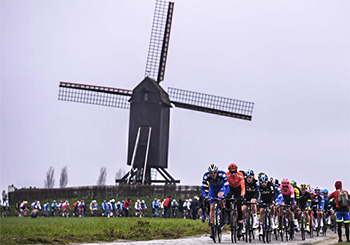
but, despite its upgraded status, surely omloop het nieuwsblad is scarcely on the same podium as its more famous peers: ronde van vlaanderen, paris-roubaix, milan-sanremo and liege-bastogne-liege which will soon follow in its wake? there are many who would argue that this is truly the case, an argument to which i might even be inclined to pay lip service, but if it becomes absolutely necessary to explain why the omloop is deserving of our loudest approbation, other than the fact that it's a bicycle race in belgium, it surely rests on the fact that it shares the stage with the first cuckoo of spring, the first snowflake of winter and the first day of the hebridean summer on 20th august (two days ahead of the onset of the hebridean winter).
with luck, it will also be the first day of 2020 on which i make full use of my eurosport player subscription, failing which, there's bound to be an internet feed near me and you. and if continually and nonchalantly spouting 'omloop het nieuwsblad' doesn't engender any specific interest from your colleagues in the office, always remember that march 1 will see the equally inscrutably named kuurne-brussels-kuurne (010320). if that doesn't do it, it's time to think of changing your employment.
photos: photonews
tuesday 18 february 2020
 ..........................................................................................................................................................................................................
..........................................................................................................................................................................................................